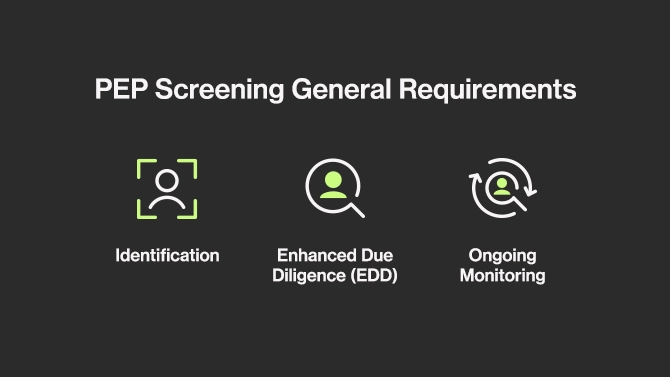Most compliance professionals are well aware that regulators can levy penalties not only when compliance programs fail but also when compliance measures are insufficient. As a result, obligated industries must implement a flawless risk-based approach to the Anti-Money Laundering (AML) program. For this reason, one of the most significant parts of an effective compliance program – PEP screening – should never be overlooked.
In this article, you will find out what a politically exposed person (PEP) screening is and how it can prevent financial crime such as money laundering and terrorist financing.

What is PEP Screening?
A politically exposed person is an individual that holds or has held a prominent public-sector role. Government officials, heads of state, high-ranking judges or military officers, and governors are common examples.
According to the Financial Action Task Force (FATF), all high-ranking officials are considered to be higher risk due to their possible involvement in bribery, corruption, money laundering or other financial crimes. In order to prevent illicit activities, financial institutions and other industries must conduct PEP screening processes. This process determines whether an individual is a PEP by screening official PEP lists and is crucial to effective risk management.
Types of PEPs
Politically Exposed Persons (PEPs) are typically categorized based on the geographic scope of their influence. Regardless of whether they operate domestically or internationally, thorough identification and screening of PEPs—along with their close associates and immediate family members—are essential for effective risk management and regulatory compliance.
The two primary types of PEPs are:
Foreign PEPs
Foreign PEPs are individuals who hold or have held prominent public positions in a foreign country. This group includes high-ranking politicians, diplomats, military leaders, and executives at international organizations. Due to their cross-border influence and access to government resources, foreign PEPs present a heightened risk of involvement in bribery, corruption, or financial crimes. Screening these individuals and their associates is a critical component of AML and KYC protocols, enabling organizations to conduct in-depth due diligence measures and mitigate cross-jurisdictional risk exposure.
Domestic PEPs
Domestic PEPs are individuals in influential roles within their own country. This includes national government officials, members of parliament, judges, law enforcement heads, or senior executives at state-owned enterprises. While their influence is localized, domestic PEPs face similar risk factors as their foreign counterparts. Ensuring these individuals—and those closely connected to them—undergo proper screening is vital to detect potential corruption, enforce compliance standards, and safeguard the organization from reputational damage or regulatory penalties.
How Does PEP Screening Work?
During the PEP screening process, a Know Your Customer (KYC) specialist or a screening service compares the client’s personal information against the PEP list database. An extensive PEPs check is an inherent part of a due diligence procedure that is performed during the customer onboarding process.
Since exposure to bribery and corruption is not limited to just politically exposed persons, their immediate family members and close associates can also be at risk if they attempt to take advantage of their association with the PEP in question. Other individuals who may fall under this designation include former PEPs and people who have been entrusted with handling money on behalf of a PEP – for example, an accountant or lawyer working for them. As a result, AML compliance laws require both PEPs and people associated with them to be treated as higher risk. It means that when a KYC specialist finds a client on PEP lists, they must begin an procedure.
Why is PEP Screening Important?
Just like sanctions screening, PEP screening is an essential component of a risk-based AML compliance program since it helps to mitigate potential customer risks and fight financial crime. Individuals in prominent public positions are entrusted with important functions in a government or another organisation that could be abused for criminal purposes, such as fraud, bribery, or money laundering.
A PEP can also make decisions about large sums of money or critical infrastructure projects in their country. Effective politically exposed person checks can help financial institutions and law enforcement to prevent PEPs from abusing their positions of power.
It’s worth noting that failure to establish a client’s PEP status can result in hefty regulatory penalties. Businesses must monitor their customers and partners at the start of any business relationship and implement ongoing monitoring to avoid repercussions.
What are the PEP Screening Requirements?
PEP screening regulatory requirements are designed to mitigate the risk of financial crimes such as money laundering and corruption. The specific requirements for PEP screening vary by country, but they generally adhere to international standards set by organisations like the Financial Action Task Force.
General Requirements:

- Identification: Firms must identify whether a customer or beneficial owner is a PEP. This includes foreign PEPs, domestic PEPs, and international PEPs.
- Enhanced Due Diligence (EDD): PEPs are considered high-risk, and therefore, financial institutions must apply enhanced due diligence procedures. This involves more rigorous verification processes and continuous monitoring of the customer’s activities.
- Ongoing Monitoring: Continuous monitoring of PEPs’ accounts is crucial. This includes tracking any changes in their status or circumstances, such as job changes or shifts in their level of influence.
Specific Country Requirements:
- United States: Screening is required for foreign and international PEPs, but not mandatory for domestic PEPs. Compliance is regulated under the Bank Secrecy Act and the Patriot Act, which require firms to integrate PEP screening into their risk-based AML programs.
- United Kingdom: The UK mandates comprehensive PEP screening for both foreign and domestic PEPs. However, recent amendments have introduced a risk-based approach that treats domestic PEPs as lower-risk compared to foreign PEPs, subjecting them to a lesser degree of EDD unless other risk factors are present.
- France: Aligns with EU Anti-Money Laundering Directives (AMLDs), requiring robust PEP screening for national and foreign PEPs. Changes in 2023 have adjusted the definitions and criteria for PEPs to reflect current risk perceptions.
- Saudi Arabia: Requires screening for all types of PEPs (foreign, domestic, and international) with stringent measures under its AML framework. Enhanced ongoing monitoring and senior management approval are necessary for PEP-related accounts.
- United Arab Emirates (UAE): Financial institutions must establish strong risk management systems to identify PEPs. This includes detailed customer due diligence processes and ongoing monitoring.
Why Should You Implement an Automated PEP Screening Service?
Unfortunately, there’s a lack of a single PEP list that consolidates all politically exposed person checks worldwide. This makes the due diligence process used to prevent financial crimes a complex and long procedure.
As a result, global companies spend a lot of resources checking all relevant lists when onboarding new clients and partners. The significant expenses related to labour and time spent on PEPs checks make manual screening inefficient.
With the market of effective KYC compliance software expanding, many companies have started abandoning manual processes and instead rely on KYC tools for PEP screening automatisation. Minimising the need for human input boosts the speed of the screening process, lowers its cost, and allows companies to focus on their primary functions.
Best Practices for PEP and Sanction Screening
PEP and sanction screening are integral components of effective Anti-Money Laundering (AML) and Know Your Customer (KYC) compliance programs. To protect themselves from reputational damage, regulatory penalties, and financial crime risks, institutions must take a structured and strategic approach. Below are key best practices to ensure robust screening and ongoing compliance.
1. Risk-Based Approach
A risk-based approach is the foundation of effective PEP and sanction screening. Institutions should begin with an internal risk assessment to define the criteria for identifying PEPs and establishing the appropriate level of due diligence.
Global guidance recommends applying enhanced due diligence (EDD) to PEPs and filing suspicious transaction reports where warranted. Rather than applying the same level of scrutiny to every client, organizations should evaluate PEPs along a risk spectrum based on their role, authority, and political exposure.
2. Individual Risk Rating
Risk ratings should be applied at the individual level. Foreign PEPs, for instance, often pose greater risk and may require deeper scrutiny. Compliance teams should assess a client’s background, political influence, jurisdiction, and business dealings to assign an appropriate risk level. This enables more precise decision-making and targeted monitoring.
3. Comprehensive Due Diligence
Institutions must tailor due diligence procedures to match the customer’s risk profile. This includes:
- Documenting the PEP’s position, duration of exposure, and country of influence
- Understanding the purpose and nature of the business relationship
- Verifying the source of funds and wealth using reliable, independent sources
- Monitoring account activity for inconsistencies or red flags
These steps form a complete picture of the customer and enable proactive risk mitigation.
4. Approvals and Periodic Reviews
High-risk relationships, especially those involving PEPs, should require senior management approval. Decision-makers must have a clear understanding of financial crime risks and the organization’s AML framework.
Periodic reviews of PEP relationships are equally important. Risk levels should be re-evaluated regularly, and institutions should maintain a process to downgrade PEP status when appropriate based on current roles and exposure.
5. Staff Training and Awareness
Regular AML training is essential for both frontline employees and compliance professionals. Staff should be well-versed in PEP definitions, due diligence protocols, and red flag indicators.
While technology can support detection, the role of human judgment remains vital in navigating complex scenarios. Training ensures personnel can make informed decisions and uphold the integrity of compliance efforts.
6. Integration with Reliable Data Sources
Accurate and effective screening depends on access to trusted data sources. This includes:
- Reputable PEP databases
- Government-issued and international sanctions lists
- Adverse media and negative news sources
By integrating high-quality data into the screening process, institutions reduce the risk of missing key information and enhance overall reliability.
7. Ongoing Monitoring
Screening should not end after onboarding. Continuous monitoring ensures that institutions stay alert to changes in a customer’s risk profile, such as a new political appointment or emergence in adverse media.
Real-time updates help identify red flags early, enabling swift action and ensuring compliance with evolving regulatory expectations.
8. Use of Advanced Technology
Leveraging modern compliance technology significantly enhances screening capabilities. Automated systems can perform:
- Real-time database checks
- Sanctions and watchlist comparisons
- Intelligent risk scoring with fewer false positives
Adopting sophisticated tools improves both accuracy and efficiency, enabling compliance teams to focus on investigation and strategic oversight rather than manual review.
Automating the PEP Screening Process
Failing to notice a politically exposed person in time can damage any business relationship. That is why all financial institutions should invest in an efficient PEP screening process and enhanced due diligence tools. This risk-based approach protects the company and avoids involvement of law enforcement agencies. Since the status can change anytime, regulators additionally require ongoing risk assessment and monitoring of any politically exposed person.
The best way to implement this for businesses is often investing in an automated PEP screening process. With Ondato, your company ensures PEP status is monitored in real time without additional resources or human error as well as allows you to set up ongoing monitoring tools.







